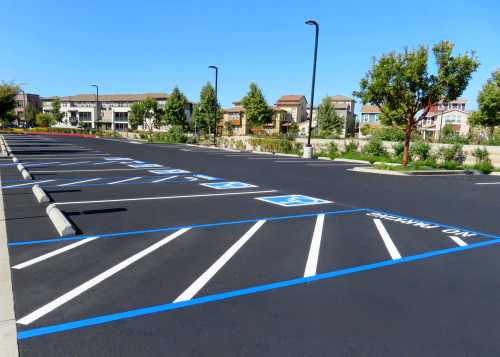Paving for Accessibility: Ensuring ADA Compliance in Public and Private Spaces

In today’s world, accessibility is a key component of public and private spaces. With the passing of the Americans with Disabilities Act (ADA) in 1990, there are now specific guidelines and requirements for ensuring that all individuals, regardless of their abilities, have equal access to buildings and amenities. One of the most important aspects of ADA compliance is paving, as it plays a crucial role in ensuring that individuals with mobility issues can navigate spaces safely and easily.
Importance of ADA Compliance in Paving
Paving plays a crucial role in ensuring ADA compliance in both public and private spaces. Whether it’s a sidewalk, parking lot, or pathway, properly paved surfaces are essential for individuals with disabilities. Uneven or broken pavement can create obstacles for individuals using wheelchairs or walkers, making it difficult or impossible for them to access certain areas. It’s essential for paving in these spaces to meet ADA standards to ensure that everyone has equal access.
ADA Requirements for Paving
When it comes to paving for accessibility, there are specific requirements outlined in the ADA that must be followed to ensure compliance. These requirements cover everything from the slope and width of pathways to the type of materials used for paving. For example, ADA guidelines dictate that pathways must have a slope of no more than 1:20 to ensure ease of navigation for individuals using wheelchairs or other mobility devices. Additionally, pathways must have a clear width of at least 36 inches to accommodate the space needed for wheelchair users to pass safely.
Choosing the Right Paving Materials
Choosing the right materials for paving is essential for ensuring ADA compliance. The type of material used can impact the accessibility of a space, as certain surfaces may be more difficult for individuals with mobility issues to navigate. For example, loose gravel or stones can be challenging for individuals using wheelchairs, as they may get stuck or cause the chair to tip. Smooth, level surfaces such as concrete or asphalt are ideal for paving in ADA-compliant spaces, as they provide a stable and easy-to-navigate surface for all individuals.
Maintaining ADA Compliance
Maintaining ADA compliance in paved spaces is an ongoing effort that requires regular maintenance and attention to detail. Over time, wear and tear can cause surfaces to become uneven or damaged, posing barriers to accessibility for individuals with disabilities. It’s essential for property owners and managers to regularly inspect and repair paved surfaces to ensure that they meet ADA standards and provide safe access for all individuals. This may involve filling cracks, leveling surfaces, or resurfacing areas that have become worn or damaged.
Public vs. Private Spaces
While ADA compliance is required for all public spaces, including sidewalks, parks, and government buildings, it’s also important for private property owners to ensure accessibility in their spaces. Whether it’s a retail store, office building, or residential complex, private property owners have a responsibility to provide equal access for individuals with disabilities. This includes ensuring that parking lots, pathways, and entrances are all ADA compliant, so that individuals with mobility issues can access the space safely and independently.
Benefits of ADA-Compliant Paving
Ensuring ADA compliance in paved spaces offers a variety of benefits for individuals with disabilities. By providing accessible pathways and surfaces, property owners can create a more inclusive environment that allows individuals with disabilities to navigate spaces with ease. This not only benefits individuals with disabilities but also enhances the overall usability of a space for all individuals. Additionally, maintaining ADA-compliant paving can help prevent accidents and injuries, as well as protect property owners from potential liability issues related to accessibility.
Summary
Paving plays a crucial role in ensuring ADA compliance in public and private spaces. By following ADA guidelines for paving, property owners can create accessible environments that allow individuals with disabilities to navigate spaces safely and independently. Choosing the right materials, maintaining surfaces, and prioritizing accessibility are all key components of paving for accessibility. Ultimately, ensuring ADA compliance in paved spaces benefits everyone by creating more inclusive and usable environments for all individuals.
Need a Paving Contractor in Murfreesboro, TN?
Priority Paving provides high-quality asphalt and paving services to Murfreesboro, TN and its surrounding cities. Our asphalt contractors have 38 years of experience in our industry, allowing our business to excel and provide the best paving services for our clients. We specialize in replacement, repairing, and maintenance for driveways and parking lots, with services for both residential and commercial clients. Priority Paving is looking forward to bringing our quality to your property! Call us today to schedule an appointment.
Categorised in: Paving


